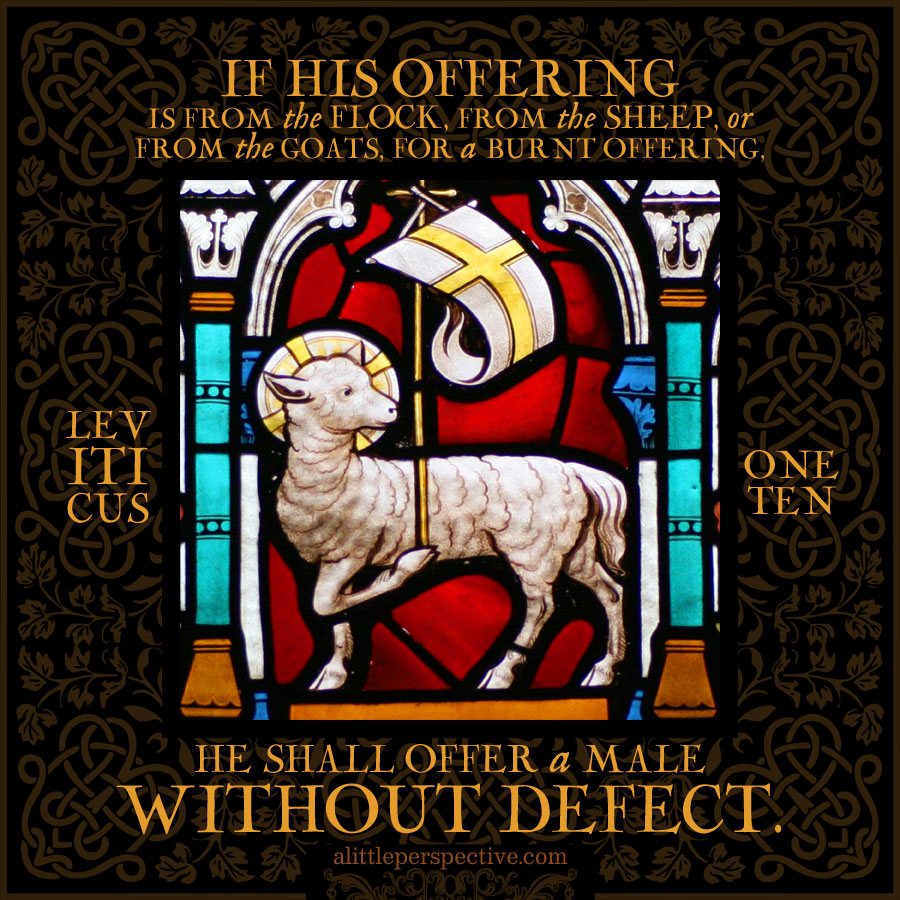Read Leviticus 1 through 3 at Bible Gateway.
Hebrew paragraph divisions:
Lev 1:1-9 {s} The law of the whole burnt offering (olah) of the herd
Lev 1:10-13 {p} The law of the whole burnt offering (olah) of the flock
Lev 1:14-17 {s} The law of the whole burnt offering (olah) of the birds
Lev 2:1-3 {s} The law of the grain offering (minchah) of flour
Lev 2:4 {s} The law of the grain offering (minchah) of unleavened cakes
Lev 2:5-6 {s} The law of the grain offering (minchah) of unleavened bread
Lev 2:7-13 {s} The law of the grain offering (minchah) of unleavened porridge
Lev 2:14-16 {p} The law of the grain offering (minchah) of firstfruits
Lev 3:1-5 {p} The law of the peace offering (shelem) of the herd
Lev 3:6-11 {p} The law of the peace offering (shelem) of the flock
Lev 3:12-17 {p} The law of the peace offering (shelem) of the goats
The strong themes:
Lev 1:1-13 {s+p} The law of the voluntary whole burnt offering of the herd or flock
Lev 1:14-2:16 {sx5+p} The law of the voluntary burnt offering of birds or grain
“Offering” and “burnt offering” are two distinct words in Hebrew, and they have a fascinating definition from the ancient Hebrew pictographs.
Offerings brought under the Levitical sacrificial system:
1) burnt sacrifice (Lev 1:1-17)
This is an olah in Hebrew, a rising up (as smoke) in worship. The olah was a voluntary offering (Lev 1:3) brought by a man in right relation with God. It is the voluntary, entire, wholly consumed by fire olah that Paul was referring to:
I beseech you therefore, brethren, by the mercies of God, that you present your bodies a living sacrifice, holy, acceptable to God, which is your reasonable service. Rom 12:1
2) grain offering (Lev 2:1-16)
Grain offering is minchah in Hebrew, a gift or rest in worship. It was made with flour and prepared in various ways. While the olah was burned entirely on the altar, only a memorial portion of the minchah was burned on the altar, and the rest given to the priest.
The final instruction concerning the olah is combined in a strong theme with the instructions for the minchah:
Lev 1:14-17 {s} The law of the whole burnt offering (olah) of the birds
Lev 2:1-3 {s} The law of the grain offering (minchah) of flour
Lev 2:4 {s} The law of the grain offering (minchah) of unleavened cakes
Lev 2:5-6 {s} The law of the grain offering (minchah) of unleavened bread
Lev 2:7-13 {s} The law of the grain offering (minchah) of unleavened porridge
Lev 2:14-16 {p} The law of the grain offering (minchah) of firstfruits
This is Scripture’s way of teaching us that just as the olah was a voluntary offering brought by a man in right relationship with God, so is the minchah. In fact this strong theme teaches what is the whole burnt offering acceptable to God in case of poverty: the poor man is not excluded from drawing near to God in worship.
3) peace offering (Lev 3:1-17)
Lev 3:1-5 {p} The law of the peace offering (shelem) of the herd
Lev 3:6-11 {p} The law of the peace offering (shelem) of the flock
Lev 3:12-17 {p} The law of the peace offering (shelem) of the goats
Peace offering is in Hebrew, shelem, from the same root as shalom, peace, completeness, wholeness. The idea is that when YHVH adds blessing to or subtracts cursing from a man, to bring him to completion or wholeness, to bring him into shalom, the man responds with a peace offering, a shelem; thus some Bibles translate shelem as a thank offering.
The shelem was a voluntary offering brought as a form of worship by a man in right relation with God.
Notice that Lev chapters 1-3 are all part of the same speech: Lev 1:1 begins with the LORD speaking to Moses, saying: and then the law for the burnt offering or olah, the grain offering or minchah, and the peace offering or shelem, follows. In Lev 4:1, the LORD begins a new speech, which we will look at tomorrow.

















Leave a Reply